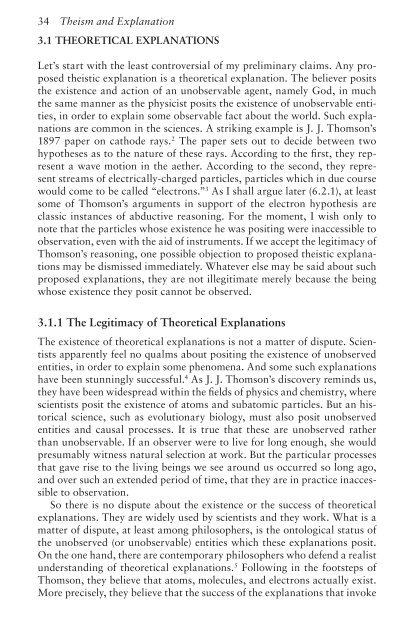Theism and Explanation - Appeared-to-Blogly
Theism and Explanation - Appeared-to-Blogly
Theism and Explanation - Appeared-to-Blogly
Create successful ePaper yourself
Turn your PDF publications into a flip-book with our unique Google optimized e-Paper software.
34 <strong>Theism</strong> <strong>and</strong> <strong>Explanation</strong><br />
3.1 THEORETICAL EXPLANATIONS<br />
Let’s start with the least controversial of my preliminary claims. Any proposed<br />
theistic explanation is a theoretical explanation. The believer posits<br />
the existence <strong>and</strong> action of an unobservable agent, namely God, in much<br />
the same manner as the physicist posits the existence of unobservable entities,<br />
in order <strong>to</strong> explain some observable fact about the world. Such explanations<br />
are common in the sciences. A striking example is J. J. Thomson’s<br />
1897 paper on cathode rays. 2 The paper sets out <strong>to</strong> decide between two<br />
hypotheses as <strong>to</strong> the nature of these rays. According <strong>to</strong> the fi rst, they represent<br />
a wave motion in the aether. According <strong>to</strong> the second, they represent<br />
streams of electrically-charged particles, particles which in due course<br />
would come <strong>to</strong> be called “electrons.” 3 As I shall argue later (6.2.1), at least<br />
some of Thomson’s arguments in support of the electron hypothesis are<br />
classic instances of abductive reasoning. For the moment, I wish only <strong>to</strong><br />
note that the particles whose existence he was positing were inaccessible <strong>to</strong><br />
observation, even with the aid of instruments. If we accept the legitimacy of<br />
Thomson’s reasoning, one possible objection <strong>to</strong> proposed theistic explanations<br />
may be dismissed immediately. Whatever else may be said about such<br />
proposed explanations, they are not illegitimate merely because the being<br />
whose existence they posit cannot be observed.<br />
3.1.1 The Legitimacy of Theoretical <strong>Explanation</strong>s<br />
The existence of theoretical explanations is not a matter of dispute. Scientists<br />
apparently feel no qualms about positing the existence of unobserved<br />
entities, in order <strong>to</strong> explain some phenomena. And some such explanations<br />
have been stunningly successful. 4 As J. J. Thomson’s discovery reminds us,<br />
they have been widespread within the fi elds of physics <strong>and</strong> chemistry, where<br />
scientists posit the existence of a<strong>to</strong>ms <strong>and</strong> suba<strong>to</strong>mic particles. But an his<strong>to</strong>rical<br />
science, such as evolutionary biology, must also posit unobserved<br />
entities <strong>and</strong> causal processes. It is true that these are unobserved rather<br />
than unobservable. If an observer were <strong>to</strong> live for long enough, she would<br />
presumably witness natural selection at work. But the particular processes<br />
that gave rise <strong>to</strong> the living beings we see around us occurred so long ago,<br />
<strong>and</strong> over such an extended period of time, that they are in practice inaccessible<br />
<strong>to</strong> observation.<br />
So there is no dispute about the existence or the success of theoretical<br />
explanations. They are widely used by scientists <strong>and</strong> they work. What is a<br />
matter of dispute, at least among philosophers, is the on<strong>to</strong>logical status of<br />
the unobserved (or unobservable) entities which these explanations posit.<br />
On the one h<strong>and</strong>, there are contemporary philosophers who defend a realist<br />
underst<strong>and</strong>ing of theoretical explanations. 5 Following in the footsteps of<br />
Thomson, they believe that a<strong>to</strong>ms, molecules, <strong>and</strong> electrons actually exist.<br />
More precisely, they believe that the success of the explanations that invoke



